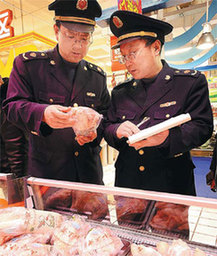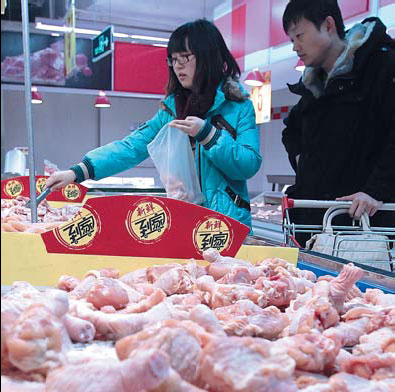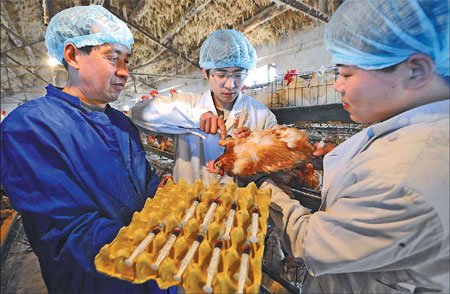Customers losing appetite for quick-grow chickens
Updated: 2013-01-07 07:41
By He Na, Yang Wanli and Shi Baoyin (China Daily)
|
||||||||
|
Health concerns over chicken meat have grown following recent media reports. Wang Jing / China Daily |
|
Above: Scientists from Tianjin Academy of Agricultural Sciences regularly take blood samples from chickens to check the health of the birds at the academy's farm. Liu Haifeng / Xinhua Right: Inspectors from the industry and commerce bureau in Zaozhuang, Shandong province, check frozen chickens at a local food market. Li Zongxian for China Daily |

Rising health concerns over rapid development of chicks, report He Na, Yang Wanli and Shi Baoyin.
Sun Xin never cooks. Her heavy workload means she always eats out or orders takeout, and the 25-year-old IT engineer in Zhongguancun, Beijing, has been a loyal consumer of KFC products since her student days.
Convenience and 24-hour opening are two of the reasons for her loyalty, but more important, she said she had always trusted the multinational brand, believing that it is able to guarantee the safety of its food.
When she can't think of what she wants to eat, Sun will automatically dial the KFC takeout hotline.
However, recently she has called the hotline a number of times, but has hung up before the call was answered. She hasn't eaten the company's products for days.
Zhang Xiufang, a native of Shanxi province who has been selling chickens and related produce at Yuandadu Tianlihong market in Beijing's Chaoyang district for many years, said that sales have recently suffered a sharp downturn.
"Generally, the New Year holiday and weekend are peak seasons for us, but the situation has changed. Half the meat I prepared to sell each day remains in storage. Customers would rather spend 10 yuan ($1.60) more per kilogram to buy free-range chicken," said Zhang anxiously.
In Nanshan Wholesale Poultry Market, the largest in Shenzhen, Guangdong province, sales of broiler chickens have dropped like a stone recently, while sales of free-range birds have risen sharply. With a daily sales volume of 60,000, free-range chickens account for more than 70 percent of the daily total.
The change has occurred following recent media reports of high levels of antibiotics and illegal growth hormones in "Instant Chickens" at some farms in the provinces of Shanxi and Shandong, the main production areas. Instant Chicken is the nickname given to birds that grow rapidly, from chicks to ready-to-eat meat in just 45 days.
On Dec 18, China Central Television reported that some poultry farmers in Shandong had given their chickens excessive amounts of antibiotics to help them survive in overcrowded coops. The report claimed international corporations such as KFC and McDonalds were supplied by these farms.
The owner of a farm in Gaomi, Shandong, told CCTV that the chickens are constantly given high doses of antibiotics because cutting off the flow would result in immediate death and loss of profits.
Statements from KFC and McDonalds stressed that chicken used in their outlets conforms to the current safety standards and that food safety is one of their primary concerns.
While the fast food companies have come under the media spotlight, shares in poultry companies have tanked since the reports and a large number of chicken farms in Shandong and Shanxi have been ordered to halt production while the Ministry of Agriculture conducts investigations.
The ministry has pledged that the results will be released when the investigations have been completed and that checks on poultry farms will be upgraded, especially those for excessive use of antibiotics.
The impact of the allegations has been great for a number of reasons: First, because chicken is a staple of Chinese dining tables; and second, because it appears to be yet another in a series of food safety scares that have battered the confidence of Chinese consumers in recent years.
Food safety scandals
The problem of food safety is a hot topic in China. The list of recent scares is long, ranging from milk contaminated with melamine, to pork containing high amounts of illegally added thin carnosine; fake salty duck eggs, where food colorants had been added to produce red yolks; illegally recycled cooking oil; and vegetables with residual levels of pesticides well above the legal limits.
"It is one of the most popular topics under discussion currently. Actually, I have no idea how long it takes for chickens to be ready for slaughter, but 45 days is still short enough to scare me away from not only KFC, but also all food containing chicken," said Sun.
"My mother always warned me that if I want to have healthy children, I should stay away from fast foods," she said. The topic has added resonance for Sun because she got engaged in November and is planning to marry in March.
The deputy director of a large chicken farm in Henan province, who would only give his surname as Yao, said sales at his farm have seen a "notable" decline in the weeks following the reports.
However, he remained upbeat. "People read too much into these cases, but they have pronounced a death sentence on other companies in the industry as well," he complained.
Yao refused to confirm or deny whether China's chicken farms regularly use excessive amounts of antibiotics, for fear of inflaming the situation. He would only say that the industry is undergoing a process of increased regulation and that abuse is definitely not common on a national scale. He admitted that his farm does use antibiotics, but insisted that the levels are well within the national guidelines. He also emphatically denied that his company uses growth hormones in chicken feed.
According to Yao, the most prevalent strain of chicken produced and sold in the Chinese market is the same as in Western countries. When this strain was introduced to China from the United States in the 1980s, the birds took approximately 60 days to grow to a weight of two kilograms.
"Scientific research has helped shorten the growth period, which can now be as low as 40 days," said Yao. "The improvement has resulted in a sharp increase in the food supply, not only in China but also in other countries. Foreigners eat the same kind of chicken as we do - it is rich in protein and the birds consume less feed than pigs or cattle."
Zhang Gaiping, an academician at the China Academy of Engineering and an experienced researcher into the rapid detection of epidemics in animals, said the acceleration in the growth rate is one of the benefits of technological advancement.
"Would the rapid production of table-ready chicken be impossible if we didn't use some drugs to make them grow? The nickname "instant chicken" reflects a consumer panic about food safety. If the growth process is strictly supervised and the chickens are produced without the addition of substances that are against the regulations, consumers can feel easy about consuming them. It won't harm people's health because the chicken's growth cycle is short," said Zhang, quoted by the China Science Daily.
Antibiotics battle
In Yao's opinion, the 45-day growth period is not problem in itself, but he, like other experts, viewed the excessive use of antibiotics as a major concern.
"No matter if it's poultry farming or clinical treatment, the use of antibiotics should be strictly limited. Antibiotic abuse will inevitably lead to bacteria developing a higher resistance to the drugs. In some cases, the overuse of unnecessary antibiotics may result in bacterial variations," said Ji Lianmei, a pharmacist at Beijing United Family Hospital.
"It doesn't mean people should panic about antibiotics. The correct use of antibiotics in poultry farming is necessary to keep the birds free from disease and their high metabolism of drugs will help to expel the antibiotics from the poultry naturally," he said.
"But the flesh of poultry that haven't fully metabolized the drugs will still contain antibiotic traces and if people eat the meat they will also take in the antibiotics. Although the dosage is lower than that prescribed in hospitals, it may still have a negative effect if it accumulates," said Ji.
Huang Yonghuai, a veterinarian at a chicken farm in Sichuan province, said antibiotics are commonly added to the feed given to chicks to prevent disease. "But they should not be added to the feed given to adult chickens, except when they are sick," he said
The Ministry of Agriculture hasn't yet established a specific regulation to define "proper use" or "abuse" of antibiotics, said Huang. But he added that certain types of antibiotics, those normally only used to treat humans, are not allowed in the treatment of sick poultry. "But some farms have exploited legal loopholes, and that has led to the scandal," he said.
"If overused, the antibiotics will also kill the good bacteria in the chickens, reducing their ability to remain healthy," he added.
"Instant chicken" has become a hot topic on the micro blog service, Sina Weibo, with many posters expressing their anger about the issue and also their concerns about food safety in China.
Zhu Yi, associate professor at the College of Food Science and Nutritional Engineering at China Agricultural University, suggested that supervision departments should pay more attention to "antibiotic chicken", just as they did to pigs when the news broke about the illegal addition of carnosine to pork.
"Nowadays, farmers can't get rich simply by planting crops. The agricultural and related products processing industry has great potential. For these products, including poultry, we encourage large-scale professional, standard production procedures," said Qin Fu, director of the institute of agricultural economics and development at the Chinese Academy of Agricultural Sciences.
"However, driven by the need to maximize profits, many poultry farmers choose to go against standard production rules, such as raising too many chickens in too small a space, and neglecting sanitation at the farms. Chickens raised in poor environments such as these are vulnerable to sickness, so it's inevitable that farmers will overdo the use of antibiotics," said Qin.
Government departments, such as quality supervision, inspection and quarantine, have failed to detect this deep-rooted problem, and a lack of supervision also needs to be blamed. The "instant chicken" case has once again indicated that many loopholes still remain in food safety legislation, he added.
"Science and technology can change people's lives and greatly increase productivity. But that doesn't mean we can go against nature or the rules, because that's always a dangerous path to tread," he warned.
Contact the reporter at hena@chinadaily.com.cn and yangwanli@chinadaily.com.cn
(China Daily 01/07/2013 page6)

 In Photos: 7.0-magnitude quake hits Sichuan
In Photos: 7.0-magnitude quake hits Sichuan
 Li Na on Time cover, makes influential 100 list
Li Na on Time cover, makes influential 100 list
 FBI releases photos of 2 Boston bombings suspects
FBI releases photos of 2 Boston bombings suspects
 World's wackiest hairstyles
World's wackiest hairstyles
 Sandstorms strike Northwest China
Sandstorms strike Northwest China
 Never-seen photos of Madonna on display
Never-seen photos of Madonna on display
 H7N9 outbreak linked to waterfowl migration
H7N9 outbreak linked to waterfowl migration
 Dozens feared dead in Texas plant blast
Dozens feared dead in Texas plant blast
Most Viewed
Editor's Picks

|

|

|

|

|

|
Today's Top News
Live report: 7.0-magnitude quake hits Sichuan, heavy casualties feared
Boston suspect cornered on boat
Cross-talk artist helps to spread the word
'Green' awareness levels drop in Beijing
Palace Museum spruces up
First couple on Time's list of most influential
H7N9 flu transmission studied
Trading channels 'need to broaden'
US Weekly

|

|









